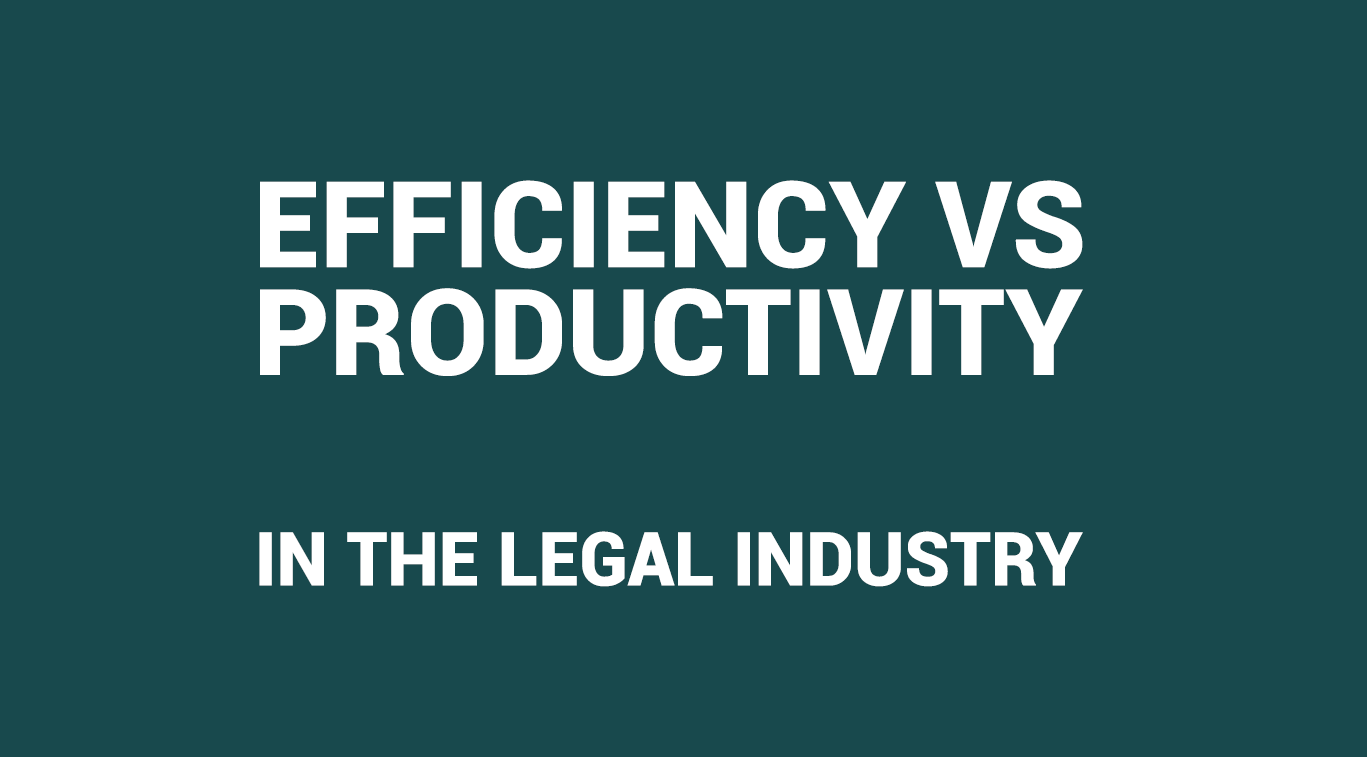Efficiency vs Productivity in the Legal Industry

Written by Fatima Freifer
Blogger

Introduction
In the traditional business world, there is a tense balance between efficiency and productivity.
Companies need to operate as efficiently as possible to save money and increase profits with the use of legal software tools and law firm workflow solutions.
At the same time, companies need to produce as much value as possible in order to keep customers returning.The legal industry is one of the most productive industries today. Legal professionals can provide even more value by becoming more efficient with their resources and streamlining processes where it makes sense. [1]
In the legal industry, it is estimated that the average billable hour in the legal services market is 20-25 hours. This compares with around 15-20 hours in other sectors, such as software and information technology services, for example. [2] There are numerous reasons for this high rate of cost, including lack of relevant legal timekeeping and billing software technology or outdated law firm billing software, workflow inefficiencies and an emphasis on billable time rather than output or productivity. That said, things are changing. The rise of legal technology trends such as artificial intelligence (AI), blockchain, alternative fee arrangements and remote working are all disrupting the legal industry in some way.
Productivity and Efficiency in the Legal Industry
Efficiency is often confused with productivity, but the two terms are not interchangeable. Productivity refers to how much is produced from a certain amount of input, such as time, while efficiency refers to how well something is done. When productivity is discussed in the legal industry, it touches upon how effectively individuals, teams, or law firms use their time as a resource. Productivity goals are usually defined and quantifiable, and the best practices for achieving them are well researched. [5]
Efficiency relates to the cost or resource intensity of producing a particular output. Efficiency can be measured in terms of cost, time, or both. For example, a firm may have top notch lawyers who excel at bringing in clients. This increases revenue, but if the firm is not efficient, the overhead costs could eat up most of the profits.
The difference between productivity and efficiency
Productivity is about doing more with what you have by increasing efficiency and effectiveness. Efficiency is about doing less with what you have by reducing inefficiencies, such as through the use of workflow and document management systems. [3] The simplest way to think about the difference between productivity and efficiency is to look at it through the lens of time. Productivity is about how well you use your time, while efficiency is about how little time you spend on something. In the legal industry, productivity is most important when it comes to managing client expectations. [4] If a law firm is productive, it is likely meeting or exceeding its client engagements. That means clients are likely to come back because they are getting the results they strive for. In contrast, if a law firm is efficient, but not productive, it could still be taking on more work than it can handle, making promises it cannot sustain, or leaving clients in the lurch.
Increasing productivity and efficiency within the legal industry
There are a number of ways that law firms can increase productivity in the legal industry. The first step is to conduct a productivity assessment to identify where inefficiencies lie. [6] From there, firms can work to eliminate or reduce inefficiencies, put in place systems and processes that support productivity, and hire the right people. A law firm can also increase productivity by using technology to automate existing processes, which can reduce the amount of time spent on low-value, manual tasks. In addition, it is important to understand how productivity fits into the whole picture. Although productivity is important, it should not take priority over meeting client expectations or bringing in new business to the firm.
There are a number of different ways to increase efficiency in a law firm. One way is to outsource some of the firm’s activities, such as document review through using a secure document management system or a paperless office document management software. This can bring down the cost of those services and free up in-house staff to focus on higher value-added tasks. [7] Another way to increase efficiency is to change how things are done. For example, firms can implement better project management practices or process improvements to eliminate or reduce time-consuming bottlenecks. It is important to note that increasing efficiency does not always mean an increase in expenditure. Some of the best ways to improve efficiency are through process improvements and changes to the way tasks are implemented.
The Importance of Productivity and Efficiency in the Legal Industry
Productivity is crucial to the success of law firms because it measures how effectively they use their resources. If a law firm is productive, then it translates to performing a good job of balancing the amount of work it has with the number of people it has to undertake it. [8] A law firm’s ability to deliver results for clients as well as manage its own internal operations is largely determined by how productive it is, particularly through the embracement of company law software such as an office document management system . If a law firm is able to do more output with the same number of people, it will be more profitable. If a law firm has more work than its people can handle, it will either have to turn away prospective clients or dispense time to hire more talent. [9]
Efficiency is important because it measures how much work a law firm does with a certain amount of resources. If a law firm is efficient, then it is getting the most work done with the least amount of money or other resources. If a law firm’s operations are efficient, then it is likely able to keep costs down while still delivering stellar results. [10] The efficiency of a law firm is important to its client relationships. If a law firm is efficient with its operations, it is likely able to get work done quickly with the fewest resources possible. That means that the fees are more reasonable for clients as a result of spending less on operations.
Conclusion
Productivity and efficiency are both important metrics in the legal industry, but efficiency is often given more attention than it deserves. While efficiency is important, it is important to remember that it is easier to increase efficiency than it is to increase productivity. If a law firm focuses on increasing productivity, it is more likely to reduce inefficiencies along the way.
References
[1] According To Experts, How Can The Legal Industry Improve Efficiency? https://www.theformtool.com/according-experts-can-legal-industry-improve-efficiency/
[2] Law Firm Billing: Breaking Away from the Billable Hour, Fatima Freifer https://goodlawsoftware.co.uk/law/law-firm-billing-breaking-away-from-the-billable-hour-2/
[3] We simply have to improve our efficiency, Robert Mowbray, March 1, 2019 https://www.lawskills.co.uk/articles/2019/03/improving-efficiency-in-the-legal-sector/
[4] How Law Firms Are Developing And Maintaining Prospective Long Term Client Relations, Fatima Freifer https://goodlawsoftware.co.uk/business-management/how-law-firms-are-developing-and-maintaining-prospective-long-term-client-relations/
[5] How Law Firms Can Avoid Paying the Price of Poor Productivity, Guy Phillips, Dec 21, 2020 https://www.lawyer-monthly.com/2020/12/how-law-firms-can-avoid-paying-the-price-of-poor-productivity/
[6] Why Legal Firms Are Focusing Their Outsourcing Efforts, Fatima Freifer https://goodlawsoftware.co.uk/business-management/why-legal-firms-are-focusing-their-outsourcing-efforts/
[7] 4 Ways For Law Firms To Be More Productive And Efficient https://www.legalserviceslink.com/blog/4-ways-for-law-firms-to-be-more-productive-and-efficient/
[8] The Allure Of Toxic Productivity, Olga V Mack, June 21, 2021 https://abovethelaw.com/2021/06/the-allure-of-toxic-productivity/
[9] Five Ways for Law Firms to Become More Efficient, Holly Urban September 24, 2018, https://www.lawtechnologytoday.org/2018/09/five-ways-for-law-firms-to-become-more-efficient/
[10] 7 productivity tips for lawyers to improve efficiency https://www.casedo.com/insights/improving-efficiency-and-productivity/7-productivity-tips-for-lawyers-to-improve-efficiency/








